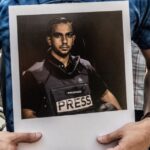
A coalition of countries established to defend media freedom struggled to formulate a response to Israel’s killing of six Palestinian journalists in Gaza last month, emails reveal, with members of the group missing a deadline to join a statement condemning violence against media.
The Media Freedom Coalition did eventually issue a statement denouncing violence against journalists in Gaza on August 21, nearly two weeks after an Israeli drone strike killed four Al Jazeera journalists, including well-known correspondent Anas al-Sharif, and two other media workers.
- list 1 of 4‘Gulf region at risk’: Qatar seeks ‘collective response’ to Israeli attack
- list 2 of 4Who was Charlie Kirk? What we know about the shooting and the suspect
- list 3 of 4All to know about India vs Pakistan at the T20 Asia Cup
- list 4 of 4Tributes pour in for slain US conservative activist Charlie Kirk
end of list
The coalition, which includes 51 member countries, did not mention the journalists by name in its statement, but decried the “deliberate targeting” of media workers and called for the investigation and prosecution of those responsible.
Emails obtained from Sweden’s Ministry for Foreign Affairs provide a new insight into the challenges the coalition faced formulating a joint response to Israel’s targeted killing of media workers amid the competing views of its members.
Al Jazeera obtained the emails from the Swedish government, which is a member of the coalition, under a freedom of information request.
While the Media Freedom Coalition’s secretariat asked member countries to respond by midday on August 20 if they wished to be included in the joint statement, only 16 did so by the deadline, the emails show.
In emails to the secretariat hours before the cut-off time, Swedish foreign affairs official Christina Linnarud wrote in an email that it “might be difficult” to meet the deadline and requested more time to make a “final decision” on whether the Swedes would add their name to the statement.
Advertisement
Linnarud also requested information on which other countries had signed on to the statement.
Tally Kapadia, project coordinator at the coalition’s London-based secretariat, responded that it “should be no problem” if Sweden confirmed its participation after the deadline had expired later that day.
Kapadia noted that other countries were “in the same position of not being able to have met the deadline” and said she expected the list of participants to grow.

It is not clear which countries met the deadline and which requested more time as their names were redacted in the emails before their release.
Ultimately, 21 countries, including Sweden, the United Kingdom, Canada, Australia and France, joined the statement that was released to the public.
But more than half of the Media Freedom Coalition’s members, including the United States, South Korea, Argentina, and the Maldives, did not put their names to the statement.
While the specific issues that may have divided the coalition’s members are unclear, Kapadia noted in email correspondence that we “tried our best to accommodate all red lines”.
Kapadia also told members that while the statement did not “cover everything”, it should still be viewed as “an important step forward as a collective”.
The statement had stuck to “core issues” – rather than specific events – given the pace of developments in Gaza and the “likelihood of our statement not reaching consensus quickly enough to react to the news in a timely way”, Kapadia said.
Kapadia also noted that members had been given less time to sign up than usual because many countries were “extremely keen to get this out as soon as possible”.
In response to a request for comment about the deliberations described in the emails, the Media Freedom Coalition’s secretariat said that multilateral statements “require agreement among many governments, and expectedly, that process takes time”.
“The Media Freedom Coalition’s priority is to deliver strong, united positions that carry maximum impact in defending and advancing media freedom,” the secretariat said.
Established in 2019 at the initiative of the UK and Canada, the Media Freedom Coalition has issued statements expressing concern about media freedom in numerous countries and jurisdictions, including Russia, Turkiye, Hong Kong and Venezuela.
Last year, the coalition expressed concerns about Israel’s shutting down of Al Jazeera’s operations in the occupied West Bank.
But the coalition’s statement on the killing of journalists in Gaza last month was its first concerning the enclave since the start of Israel’s war in October 2023.
Advertisement
The Committee to Protect Journalists (CPJ) says almost 200 media workers have been killed in Israeli attacks in Gaza during that time.
Israel’s August 10 slaying of the six journalists, including Al Jazeera correspondents Mohammed Qreiqeh and al-Sharif, as well as camera operators Ibrahim Zaher and Mohammed Noufal, prompted an outpouring of condemnation from governments and media freedom groups, including Reporters Without Borders and the CPJ.
The Al Jazeera Media Network condemned the killings as a “blatant and premeditated attack on press freedom”, and a “desperate attempt to silence the voices exposing the impending seizure and occupation of Gaza”.
British Caribbean News


